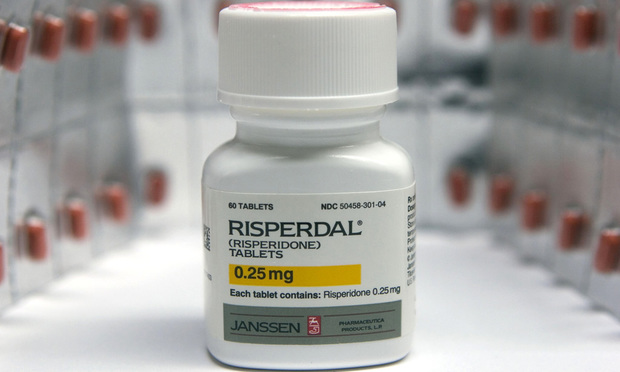Thousands of Risperdal Cases Reinstated
The start date of the statute of limitations for bringing products liability claims over antipsychotic drug Risperdal must be determined by a jury following a factual analysis in each individual case, the court ruled.
November 20, 2019 at 04:36 PM
7 minute read
The original version of this story was published on The Legal Intelligencer
 Johnson & Johnson's schizophrenia drug Risperdal at Skenderian Apothecary in Cambridge, Massachusetts, on Jan. 23, 2007. Photo: JB Reed/Bloomberg News.
Johnson & Johnson's schizophrenia drug Risperdal at Skenderian Apothecary in Cambridge, Massachusetts, on Jan. 23, 2007. Photo: JB Reed/Bloomberg News.
The Pennsylvania Supreme Court has ruled that the start date of the statute of limitations for bringing products liability claims over antipsychotic drug Risperdal must be determined by a jury following a factual analysis in each individual case.
In identical 6-1 decisions issued Nov. 20 in Saksek v. Janssen and Winter v. Janssen, the justices overturned a Superior Court ruling that granted summary judgment to Johnson & Johnson subsidiary Janssen and tossed out lawsuits filed by plaintiffs Jonathan Saksek and Joshua Winter—and, by extension, thousands of other plaintiffs—who alleged they developed excess breast tissue as a result of taking Risperdal.
The rulings in Saksek and Winter came down the same day as the U.S. Court of Appeals for the Third Circuit's similar ruling in medical device case Adams v. Zimmer. In that case, the federal appeals court reversed an Eastern District of Pennsylvania judge's grant of summary judgment in favor of device manufacturer Zimmer in plaintiff Marylin Adams' case against the company over an allegedly defective hip implant, finding that the question of when the statute of limitations began to run is one a jury must answer.
In Saksek and Winter, Philadelphia Court of Common Pleas Judge Arnold New had initially set a strict deadline for bringing Risperdal claims at two years after June 2009. On appeal, the state Superior Court moved the timeline back even farther, to Oct. 31, 2006, which is the date that the Risperdal label was changed to include the results of clinical trials that found incidences of gynecomastia in 2.3% of patients who took the drug. According to attorneys involved in the litigation, because both rulings established accrual dates as a matter of law, they resulted in the blanket dismissal of thousands of claims pending in the Risperdal mass tort program pending in Philadelphia. Those cases have now been reinstated thanks to the Supreme Court's Nov. 20 rulings.
The Supreme Court majority in Saksek and Winter, led by Justice Christine Donohue, said both the trial and appellate courts were wrong to decide the accrual date issue on summary judgment. Instead, the justices said, a jury must ultimately determine when there existed sufficient media coverage and medical literature detailing the possible link between Risperdal and gynecomastia to alert plaintiffs that they may have been injured.
"This is not to say that the publicity (including the medical journal articles) cited by the trial court in this case was insufficient to place Winter and Saksek on notice (at any particular point in time) that their ingestion of Risperdal was the cause of their gynecomastia or that their enlarged breasts were in fact the result of the growth of female breast tissue and not mere overall weight gain," Donohue said in the majority opinion. "Rather, we conclude only that reasonable minds could differ, thus requiring that the factual issues relating to Janssen's statute of limitations defense must be submitted to a jury for resolution."
Donohue was joined by Justices Max Baer, Debra Todd, Kevin Dougherty, David Wecht and Sallie Updyke Mundy.
Counsel for the plaintiffs, Kline & Specter attorneys Charles "Chip" Becker and Tom Kline, who also represent the plaintiff in Adams, said in a statement about Saksek and Winter, "Today's ruling reinstates the legal rights of thousands of people with valid Risperdal claims; combined with the affirmance of three jury verdicts and the reinstatement of the right to punitive damages, this litigation now has all of the legal impediments resolved, enabling a pathway forward for full compensation for those who were injured as a result of Johnson & Johnson's illegal off-label promotion and marketing of a powerful antipsychotic adult drug to children."
Baer penned a concurring opinion, joined by Donohue, expressing concern over "Pennsylvania's continued adherence to the narrow approach to the discovery rule," which says the statute of limitations begins to run once a plaintiff has "'actual or constructive knowledge'" of an injury and awareness that the injury was caused by another party.
"Pennsylvania's formulation of the discovery rule represents a more narrow approach than is mandated in some other jurisdictions, as it places a greater burden on plaintiffs as compared with the so-called 'liberal' approach applied by most of our sister states," Baer said. "The liberal approach looks to a plaintiff's actual or constructive knowledge of the existence of a cause of action, which tolls the statute of limitations until a reasonable plaintiff would have knowledge not only that an injury was caused by another but that the injury resulted from the negligence of another."
Chief Justice Thomas Saylor, meanwhile, filed a dissenting opinion, arguing that both Winter and Saksek should have been on notice of a potential injury when they experienced abnormal weight gain.
"Appellants all but acknowledge that they had reason to know that their excessive weight gain was 'the unfortunate result of medical treatment,'" Saylor said. "Moreover, as the majority also relates, '[a]t all relevant times, weight gain was a reported risk of Risperdal.'"
The majority said it remains an open question as to whether Saksek and Winter should have realized that the increased breast size they experienced was caused by the development of female breast tissue, as opposed to simply the byproduct of excessive weight gain, which was a known side effect of Risperdal.
Responding to Saylor's dissenting argument, Dononue wrote, "At bottom, the chief justice effectively posits that if an individual experiences one potential (but not unexpected) side effect from consuming a drug, he or she is therefore placed on inquiry notice for every other potential side effect that could possibly result from consumption of that same drug (even one, like gynecomastia, which the pre-2006 label recognized as a 'rare adverse event'). No case law from any jurisdiction supports this contention. "
The majority likewise rejected the argument that the date of the 2006 label change should have necessarily triggered the statute of limitations.
" The label does not … indicate that the ingestion of Risperdal may cause gynecomastia," Donohue said. "If Janssen's causation expert, based upon his review of the 2006 label, did not conclude that said label reflected a causal link, then it cannot be said, contrary to the Superior Court's determination, that 'reasonable minds would not differ in finding that' Winter and Saksek knew or should have known that their injuries were caused by their ingestion of Risperdal based upon Janssen's issuance of the 2006 revised label."
Donohue also noted that Winter stopped taking Risperdal in 1998 and Saksek discontinued use in 2004.
Still, the majority made clear that it was not making a determination on the merits of Janssen's arguments, including that Saksek and Winter knew as early as 1998 and 2002, respectively, that they had developed gynecomastia.
"Rather, we conclude only that given that the evidentiary record here is entirely undeveloped, and given that in summary judgment proceedings all facts of record and reasonable inferences therefrom must be construed in the light most favorable to the non-moving party, Janssen was not entitled to summary judgment as a matter of law with respect to application of the discovery rule," Donohue said. "It is for the jury to decide the material issues of fact remaining for resolution."
Defense counsel, Robert Heim of Dechert, could not be reached for comment.
This content has been archived. It is available through our partners, LexisNexis® and Bloomberg Law.
To view this content, please continue to their sites.
Not a Lexis Subscriber?
Subscribe Now
Not a Bloomberg Law Subscriber?
Subscribe Now
NOT FOR REPRINT
© 2025 ALM Global, LLC, All Rights Reserved. Request academic re-use from www.copyright.com. All other uses, submit a request to [email protected]. For more information visit Asset & Logo Licensing.
You Might Like
View All
NJ Firm Narrowly Avoids Case Dismissal Over Lengthy Complaint Filed in Fed Court
4 minute read
AstraZeneca Files Flurry of Lawsuits to Protect Cancer Treatment Drug
3 minute read

Trending Stories
Who Got The Work
J. Brugh Lower of Gibbons has entered an appearance for industrial equipment supplier Devco Corporation in a pending trademark infringement lawsuit. The suit, accusing the defendant of selling knock-off Graco products, was filed Dec. 18 in New Jersey District Court by Rivkin Radler on behalf of Graco Inc. and Graco Minnesota. The case, assigned to U.S. District Judge Zahid N. Quraishi, is 3:24-cv-11294, Graco Inc. et al v. Devco Corporation.
Who Got The Work
Rebecca Maller-Stein and Kent A. Yalowitz of Arnold & Porter Kaye Scholer have entered their appearances for Hanaco Venture Capital and its executives, Lior Prosor and David Frankel, in a pending securities lawsuit. The action, filed on Dec. 24 in New York Southern District Court by Zell, Aron & Co. on behalf of Goldeneye Advisors, accuses the defendants of negligently and fraudulently managing the plaintiff's $1 million investment. The case, assigned to U.S. District Judge Vernon S. Broderick, is 1:24-cv-09918, Goldeneye Advisors, LLC v. Hanaco Venture Capital, Ltd. et al.
Who Got The Work
Attorneys from A&O Shearman has stepped in as defense counsel for Toronto-Dominion Bank and other defendants in a pending securities class action. The suit, filed Dec. 11 in New York Southern District Court by Bleichmar Fonti & Auld, accuses the defendants of concealing the bank's 'pervasive' deficiencies in regards to its compliance with the Bank Secrecy Act and the quality of its anti-money laundering controls. The case, assigned to U.S. District Judge Arun Subramanian, is 1:24-cv-09445, Gonzalez v. The Toronto-Dominion Bank et al.
Who Got The Work
Crown Castle International, a Pennsylvania company providing shared communications infrastructure, has turned to Luke D. Wolf of Gordon Rees Scully Mansukhani to fend off a pending breach-of-contract lawsuit. The court action, filed Nov. 25 in Michigan Eastern District Court by Hooper Hathaway PC on behalf of The Town Residences LLC, accuses Crown Castle of failing to transfer approximately $30,000 in utility payments from T-Mobile in breach of a roof-top lease and assignment agreement. The case, assigned to U.S. District Judge Susan K. Declercq, is 2:24-cv-13131, The Town Residences LLC v. T-Mobile US, Inc. et al.
Who Got The Work
Wilfred P. Coronato and Daniel M. Schwartz of McCarter & English have stepped in as defense counsel to Electrolux Home Products Inc. in a pending product liability lawsuit. The court action, filed Nov. 26 in New York Eastern District Court by Poulos Lopiccolo PC and Nagel Rice LLP on behalf of David Stern, alleges that the defendant's refrigerators’ drawers and shelving repeatedly break and fall apart within months after purchase. The case, assigned to U.S. District Judge Joan M. Azrack, is 2:24-cv-08204, Stern v. Electrolux Home Products, Inc.
Featured Firms
Law Offices of Gary Martin Hays & Associates, P.C.
(470) 294-1674
Law Offices of Mark E. Salomone
(857) 444-6468
Smith & Hassler
(713) 739-1250






